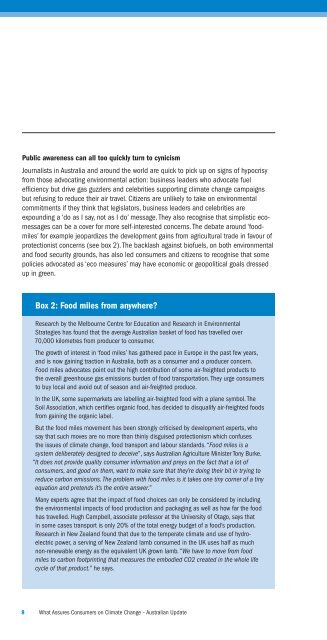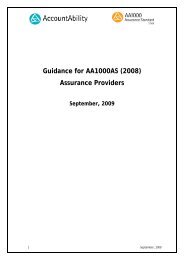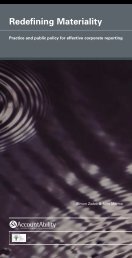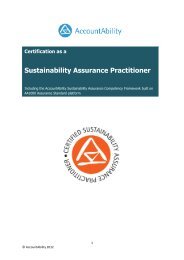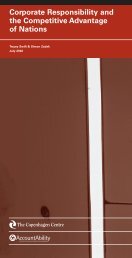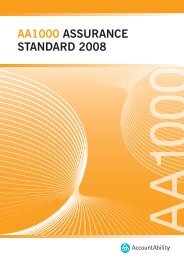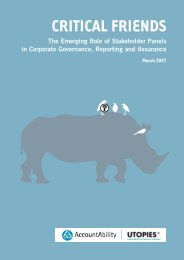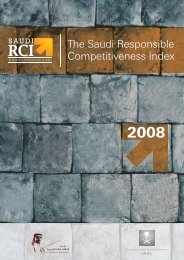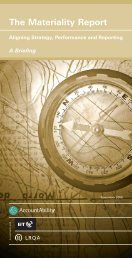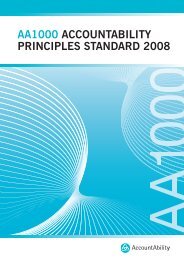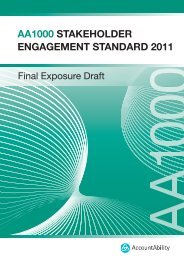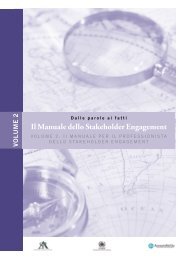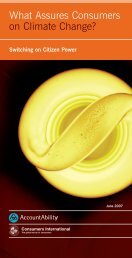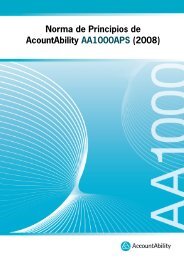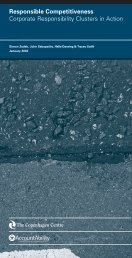Free Download - AccountAbility
Free Download - AccountAbility
Free Download - AccountAbility
- No tags were found...
Create successful ePaper yourself
Turn your PDF publications into a flip-book with our unique Google optimized e-Paper software.
Public awareness can all too quickly turn to cynicismJournalists in Australia and around the world are quick to pick up on signs of hypocrisyfrom those advocating environmental action: business leaders who advocate fueleffi ciency but drive gas guzzlers and celebrities supporting climate change campaignsbut refusing to reduce their air travel. Citizens are unlikely to take on environmentalcommitments if they think that legislators, business leaders and celebrities areexpounding a ‘do as I say, not as I do’ message. They also recognise that simplistic ecomessagescan be a cover for more self-interested concerns. The debate around ‘foodmiles’for example jeopardizes the development gains from agricultural trade in favour ofprotectionist concerns (see box 2). The backlash against biofuels, on both environmentaland food security grounds, has also led consumers and citizens to recognise that somepolicies advocated as ‘eco measures’ may have economic or geopolitical goals dressedup in green.Box 2: Food miles from anywhere?Research by the Melbourne Centre for Education and Research in EnvironmentalStrategies has found that the average Australian basket of food has travelled over70,000 kilometres from producer to consumer.The growth of interest in ‘food miles’ has gathered pace in Europe in the past few years,and is now gaining traction in Australia, both as a consumer and a producer concern.Food miles advocates point out the high contribution of some air-freighted products tothe overall greenhouse gas emissions burden of food transportation. They urge consumersto buy local and avoid out of season and air-freighted produce.In the UK, some supermarkets are labelling air-freighted food with a plane symbol. TheSoil Association, which certifi es organic food, has decided to disqualify air-freighted foodsfrom gaining the organic label.But the food miles movement has been strongly criticised by development experts, whosay that such moves are no more than thinly disguised protectionism which confusesthe issues of climate change, food transport and labour standards. “Food miles is asystem deliberately designed to deceive”, says Australian Agriculture Minister Tony Burke.“It does not provide quality consumer information and preys on the fact that a lot ofconsumers, and good on them, want to make sure that they’re doing their bit in trying toreduce carbon emissions. The problem with food miles is it takes one tiny corner of a tinyequation and pretends it’s the entire answer.”Many experts agree that the impact of food choices can only be considered by includingthe environmental impacts of food production and packaging as well as how far the foodhas travelled. Hugh Campbell, associate professor at the University of Otago, says thatin some cases transport is only 20% of the total energy budget of a food’s production.Research in New Zealand found that due to the temperate climate and use of hydroelectricpower, a serving of New Zealand lamb consumed in the UK uses half as muchnon-renewable energy as the equivalent UK grown lamb. “We have to move from foodmiles to carbon footprinting that measures the embodied CO2 created in the whole lifecycle of that product.” he says.8 What Assures Consumers on Climate Change – Australian Update


